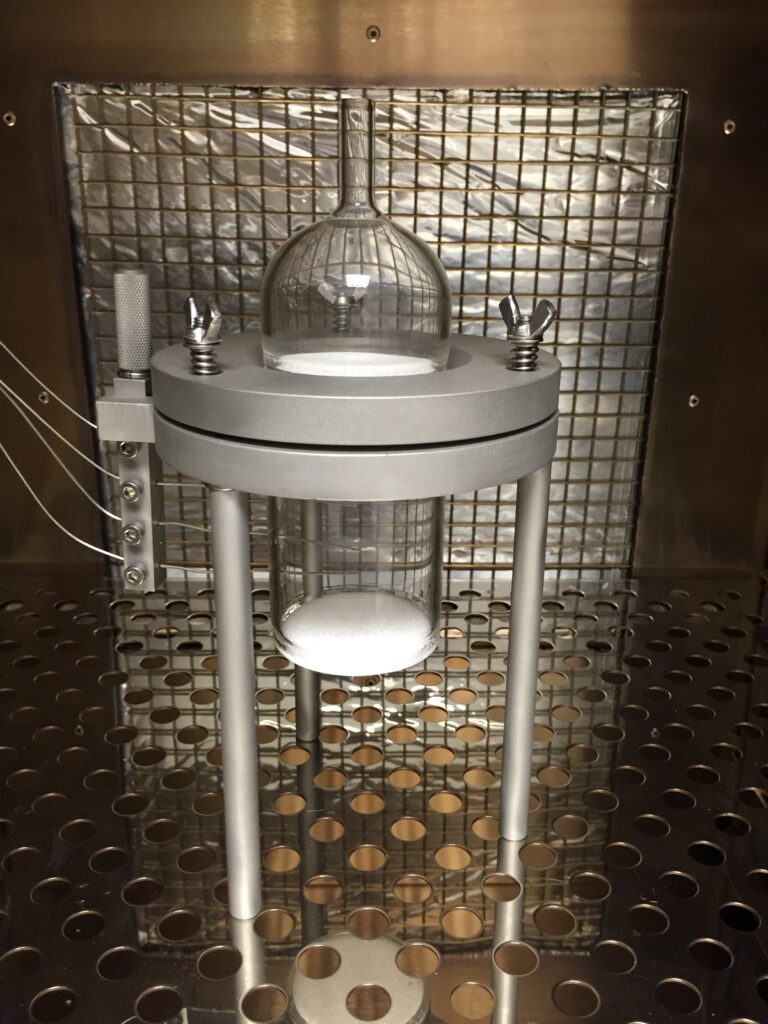
Our Solutions: Testing
Our laboratories generate test data on the thermal properties of materials.
Thermal stability testing
The safe management, handling and elimination of the dangers posed by uncontrolled exothermic activity is of vital importance to the protection of your business, people, workplace and the environment. Sigma-HSE’s thermal stability testing lab offer comprehensive standard and custom testing packages to aid you in the identification of the oxidation, combustion or molecular decomposition of materials in your workplace.
We offer a wide range of thermal stability testing services to ISO/IEC 17025:2017 standards, globally.
Discover our range of tests below and get in touch for a free consultation today.
The air over layer test is conducted to establish the onset temperature of exothermic activity on thin layers of materials when exposed to elevated atmospheric temperatures. It replicates thin layer (up to 15 mm) deposits in a drying situation i.e. drier walls or roofs where hot air may rush over the surface.
Using a small tray test cell, a sample is placed inside a cell and thermocouples are placed into the material at three locations. This assembly is then placed into a digitally controlled horizontal laboratory tube oven with a controlled heated air supply.
Either of the below tests can be performed using a data acquisition system to monitor, detect and record any exothermic activity.
An environmental temperature is digitally increased from ambient conditions up to 400°C at 0.5°C.min-1. This test configuration is used for estimating exothermic activity for onset temperature.
The loaded test cell is placed into a heated oven and set to a specified temperature for a duration of 24 hours. The temperature selected can be based on working or proposed process conditions, plus factors for safety. Alternatively, full determination can be undertaken, whereby several isothermal tests can be conducted to establish a definitive ignition temperature.
Not only is the air over layer test a necessity in evaluating whether current or proposed drying and process temperatures are safe, it can also confirm the possibility of using higher temperatures to increase productivity.
The bulk powder diffusion cell test is conducted to establish the onset temperature of the potential exothermic activity of a material when exposed to elevated atmospheric temperatures. It replicates small bulk deposits in any drying situation where air is naturally available.
Using an open cylindrical glass test cell with a sintered glass bottom and a sample is placed inside the cell. Thermocouples are then inserted through the wall into the material at four locations from the bottom upwards. This assembly is placed into a digitally controlled laboratory oven and either of the below tests are performed using a data acquisition system to monitor, detect and record any exothermic activity.
An environmental temperature is digitally increased from ambient conditions up to 400°C at 0.5°C.min-1. This test configuration is used for estimating exothermic activity for onset temperature.
The loaded test cell is placed into a heated oven and set to a specified temperature for a duration of 24 hours. The temperature selected can be based on working or proposed process conditions, plus factors for safety. Alternatively, full determination can be undertaken, whereby several isothermal tests can be conducted to establish a definitive ignition temperature.
Not only is the bulk powder diffusion cell test a necessity in evaluating whether current or proposed drying and process temperatures are safe, it can also confirm the possibility of using higher temperatures to increase productivity.
The aerated bulk powder diffusion cell test is conducted to establish the onset temperature of the exothermic activity of a material when exposed to elevated atmospheric temperatures. It replicates small bulk deposits in any drying situation where heated air is percolated through a material i.e. fluid bed driers.
Using a cylindrical glass test cell with a sintered glass bottom, the sample is placed inside the cell. Thermocouples are then inserted through its wall into the material at four locations from the bottom upwards. A glass lid is applied, and a regulated hot air supply that pushes air through the test material is connected. The assembly is placed into a digitally controlled laboratory oven and either of the below tests are performed using a data acquisition system to monitor, detect and record any exothermic activity.
An environmental temperature is digitally increased from ambient conditions up to 400°C at 0.5°C.min-1. This test configuration is used for estimating exothermic activity for onset temperature.
The loaded test cell is placed into a heated oven and set to a specified temperature for a duration of 24 hours. The temperature selected can be based on working or proposed process conditions, plus factors for safety. Alternatively, full determination can be undertaken, whereby several isothermal tests can be conducted to establish a definitive ignition temperature.
Not only is the aerated bulk powder diffusion cell test a necessity in evaluating whether current or proposed drying and process temperatures are safe, it can also confirm the possibility of using higher temperatures to increase productivity.
Can’t find the tests you need?
From exothermic effects to flashpoint testing, Sigma-HSE is your single solution provider for a range of thermal stability testing. Our dedicated team of experts are committed to helping you ensure and maintain compliance.
Receive quick and accurate data in just a few simple steps
Get in touch with one of our experts so we can learn more about your specific requirements. We’ll then generate and send you a customized quote.
Prepare your samples and ship them to one of our global laboratories.
Once we’ve received your samples, we’ll begin testing and analyzing. We’ll then create and send you a custom in-depth report with actionable insights.
If you need support after receiving your report, our after-sales support team will be on hand to assist you with any questions you may have.
Testing for the thermal properties of your facilities materials is an important
aspect of safety compliance. Learn more about how we can assist you today.

Are you visiting Sigma-HSE from outside your region? Visit your regional site for more relevant process safety solutions.